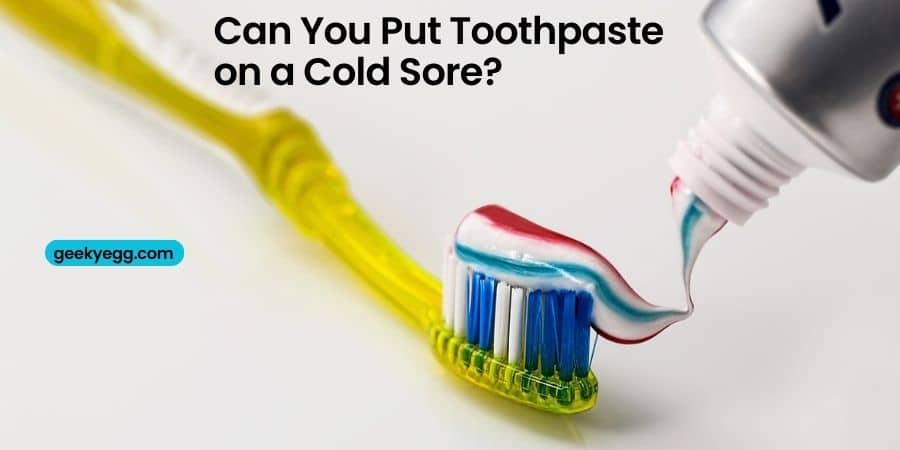Can you put toothpaste on a cold sore?
Using toothpaste on a cold sore is not advisable as cold sores are caused by a virus and require appropriate medication. Docosanol, specifically Abreva, is a highly effective option for treating cold sores, it is known as over the counter cream. These sores are caused by the herpes simplex virus (HSV), and they necessitate targeted treatment with antiviral medications, such as docosanol.
Cold sores are a common viral infection caused by the herpes simplex virus (HSV). When dealing with a cold sore outbreak, it is important to use appropriate medications for effective treatment.
While toothpaste is a widely used product for oral hygiene, it is not designed to treat cold sores. Let’s check out why regular toothpaste is not recommended for cold sores and emphasize the importance of using antiviral medications.
Can you put toothpaste on a cold sore? Some Information
Why Regular Toothpaste is Not Recommended for Cold Sores?
Regular toothpaste serves the purpose of maintaining oral health and cleaning teeth. It contains ingredients like fluoride, abrasives, and detergents that are specifically formulated for oral hygiene.
However, these ingredients are not effective in combating viral infections or promoting the healing of cold sores. Therefore, using regular toothpaste on a cold sore is not an ideal solution for treatment.
Potential Side Effects of Using Toothpaste:
Using toothpaste on a cold sore can have potential side effects due to the ingredients present in regular toothpaste. Some of these side effects include:
- Rashes: Excessive use of baking soda, found in toothpaste, can lead to the development of rashes on the skin.
- Burning Sensation: Toothpaste’s basic pH can irritate the naturally acidic pH of healthy skin, causing a burning sensation.
- Skin Irritation: Sodium lauryl sulfate, an ingredient in toothpaste, may provoke skin irritation, especially in individuals with sensitivity.
- Excess Sebum Production: Overdrying the skin with toothpaste can stimulate the skin to produce more sebum, leading to further acne breakouts.
Considering these potential side effects, it is advisable to avoid using toothpaste on cold sores.
The Importance of Antiviral Medication:
To effectively treat cold sores, it is recommended to use antiviral medications. One such medication is docosanol, available in topical cream form.
Docosanol is an FDA-approved antiviral agent specifically designed for the treatment of recurrent herpes simplex labialis episodes, commonly known as cold sores. Do you know that Abreva is used for cold sores and heals within 2 days.
The Role of Docosanol:
Docosanol, the active ingredient in certain cold sore creams, plays a vital role in alleviating symptoms and promoting faster healing. When applied at the first sign of a cold sore, such as a tingling or itching sensation, docosanol cream can effectively inhibit viral replication and reduce the severity of the outbreak.
It is important to note that docosanol does not cure the underlying HSV infection but helps manage and alleviate the symptoms associated with cold sores. Abreva is the recommended by most of the dermatologists and Abreva is expensive one too.
Proper Application of Docosanol Cream:
To maximize the effectiveness of docosanol cream for cold sores, it is important to follow these guidelines:
- Hand Hygiene: Wash your hands thoroughly before and after application to prevent spreading the virus.
- Clean the Affected Area: Gently clean the affected area with mild soap and water, then pat it dry.
- Application: Apply a thin layer of docosanol cream to the cold sore using a clean cotton swab or your fingertip.
- Absorption: Rub the cream into the cold sore until it is fully absorbed.
- Repeat Application: Repeat the application as directed by the product packaging or advised by your healthcare provider.
Other Cold Sore Management Tips:
In addition to using docosanol cream, implementing the following self-care measures can help manage cold sores and promote faster healing:
- Avoid Touching or Picking: Refrain from touching or picking at the cold sore to prevent further irritation and spreading of the virus.
- Practice Good Hygiene: Regularly wash your hands and avoid close contact with others during an outbreak to minimize the risk of spreading the virus.
- Avoid Sharing Personal Items: Do not share personal items such as utensils, towels, or lip balm to reduce the risk of spreading the virus.
- Cold Compress: Apply a cold compress or ice pack wrapped in a clean cloth to the cold sore to reduce pain and swelling.
- Pain Relievers: Consider taking over-the-counter pain relievers like acetaminophen or ibuprofen to alleviate discomfort.
Consulting a Healthcare Professional:
If you frequently experience cold sores or if your symptoms are severe, it is essential to consult a healthcare professional, such as a dermatologist or primary care physician. They can provide an accurate diagnosis, recommend appropriate treatment options, and offer guidance on managing and preventing future outbreaks.
Conclusion:
While toothpaste is a valuable product for oral hygiene, it is not recommended for the treatment of cold sores. Cold sores require targeted antiviral medications like docosanol cream to effectively manage and alleviate symptoms.
By following proper application techniques and practicing self-care measures, individuals can effectively treat cold sores and promote faster healing. Remember, consulting a healthcare professional is crucial for personalized advice on managing and preventing cold sore outbreaks.








